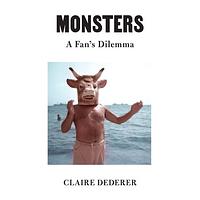You need to sign in or sign up before continuing.
Take a photo of a barcode or cover
challenging
hopeful
inspiring
reflective
slow-paced
challenging
emotional
funny
informative
reflective
sad
medium-paced
reflective
medium-paced
just okay. vague, meandering thesis and discussion of the terrible actions of artists with little to no resolution, this dragged a lot for me to my disappointment
challenging
informative
reflective
medium-paced
informative
medium-paced
informative
reflective
medium-paced
Thought this was a well written piece of criticism that brought up some thorny points. I thought the author's articulation of the issue was well done and she really toed the line; she doesn't pretend to be someone who automatically hates the work of monstrous people but also isn't saying we should just separate art and artist. I appreciate hearing her thought process as she untangles her complicated feelings and it was an interesting journey that went into a lot about our relationship to art as a fan or audience member. I do wish there was a little bit more of an answer at the end, but I guess that's the nature of thought/art/criticism sometimes?? And that we all have our own line that extends from our own experiences. Which I guess feels right but also a little unsatisfying? Is it a cop out? Idk I'm not paid the big bucks to think.
Lately I'm enjoying this brand of memoir-meets-criticism.
" 'It is always tempting, of course, to impose one's view rather than to undergo the submission required by art.' "
"Yet our moral sense must be made to come into balance with our art-love."
"Beauty is a fragile principle. It looks silly when it's brought up against utility—or morality...Beauty is what we like, whether we should or not, what we respond to involuntarily."
"Authority believes the work exists in an ideal state (ahistorical, alpine, snowy, pure). Authority ignores the natural feeling that arises from biographical knowledge of a subject." --> Does emotion have a place in criticism?
"We live in a biographical moment."
"The genius isn't so much a kind of person as a status of person: a person who can do whatever he wants."
"The contemporary ideal of the genius is a two-headed figure: both master and servant."
"How selfish do I need to be, to become as great as you?"
"When we love an artist, and we identify with them, do we feel shame on their behalf when they become stained? Or do we shame them more brutally, cast them out more finally, because we want to sever the identification? Maybe shame is the ultimate expression of the parasocial relationship."
" 'It is always tempting, of course, to impose one's view rather than to undergo the submission required by art.' "
"Yet our moral sense must be made to come into balance with our art-love."
"Beauty is a fragile principle. It looks silly when it's brought up against utility—or morality...Beauty is what we like, whether we should or not, what we respond to involuntarily."
"Authority believes the work exists in an ideal state (ahistorical, alpine, snowy, pure). Authority ignores the natural feeling that arises from biographical knowledge of a subject." --> Does emotion have a place in criticism?
"We live in a biographical moment."
"The genius isn't so much a kind of person as a status of person: a person who can do whatever he wants."
"The contemporary ideal of the genius is a two-headed figure: both master and servant."
"How selfish do I need to be, to become as great as you?"
"When we love an artist, and we identify with them, do we feel shame on their behalf when they become stained? Or do we shame them more brutally, cast them out more finally, because we want to sever the identification? Maybe shame is the ultimate expression of the parasocial relationship."
informative
reflective
medium-paced
To start, Claire Dederer is a very engaging writer and I enjoyed the writing in this book. It did leave me with many thoughts. There are some parts I agreed with (some vehemently), there are parts I take issue with (some vehemently) and there are parts I find it hard to connect with (I have never really loved Woody's Allen for example). I think she has some implied false equivalences - I can't in any world see that Joni Mitchell giving up her baby is in any way comparable to Roman Polanski raping a child - but to give Dederer credit I don't think she really means that they are the same...the book structure just implies it. I guess my cultural theorist side wanted this to be more coherent in terms of examination of the monstrous but my literary appreciation side can see that that isn't really what she is setting out to do. I think the most interesting insight is that the idea that we need to police our own consumption is an individualising response to a what is a structural problem (like recycling etc) - when I think of most of the terrible men of recent years, perhaps the most stunning thing is how much the system has protected and enabled them because they make money. She probably could have drawn this out more (well, would have if this was a culture theory text) but that wasn't what she was trying to do. In the end, this is a deeply personal book which she emphasises in her discussion of the use of "I" versus "we". Anyway, another reminder that all our faves are problematic and that it is a struggle ethically to consider how we respond and what the levels of badness are, even if perhaps the best response, as ever, is to overthrow capitalism.





